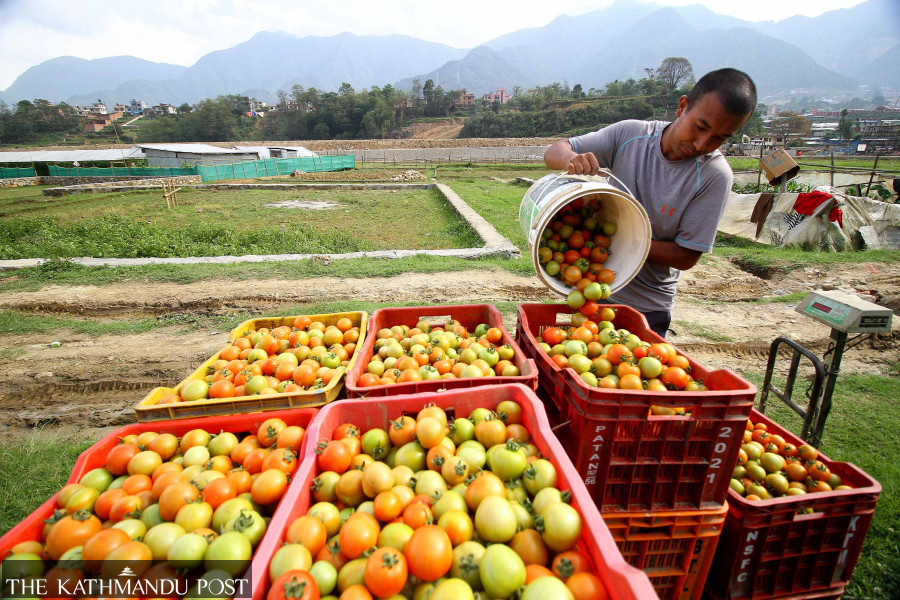Money
Soaring tomato exports push up prices in Nepal
Shipments could reach the annual export figure in a few weeks the way warehouses are being emptied, traders say.
Krishana Prasain & Jyoti Shrestha
Nepali traders have been exporting tomatoes to India by the tonne after the southern neighbour eased quarantine requirements. Shipments from Nepal have helped to relieve an unusual shortage down south where tomato-starved Indians had been paying up to Rs400 for a kilo until last week.
Traders say shipments could reach the annual export figure in a few weeks the way warehouses are being emptied. In the last fiscal year, Nepal exported 1,094 tonnes of tomatoes valued at Rs41 million.
Exporters can't stop smiling at their good fortune, but the massive exports have pushed up prices for Nepali customers who are already having a hard time due to relentless inflation.
India relaxed the quarantine process to permit easier access for Nepali tomatoes as heavy rain had disrupted domestic supply, sending retail prices soaring up to IRs242 per kg, Indian media reported.
After Nepali tomatoes arrived in India, prices started to cool down, dropping to IRs100 per kg (Rs160) on Monday.
In a statement issued on Monday, Nepal’s Ministry of Agriculture and Livestock Development said that as of Sunday, Nepal had dispatched 30 tonnes of tomatoes to India through Kakarbhitta and Bhairahawa on the eastern and southern borders respectively.
The ministry said that India had temporarily allowed imports of tomato, green pea, chilli and other vegetables by amending its plant quarantine rules. Nepal wants to continue bulk exports of its vegetables.
"We are making efforts to continue the exports beyond the temporary permits," the ministry said in a statement. "This will allow us to reduce the trade deficit, and farmers, too, will get a fair price for their produce."
According to a study done by South Asia Watch on Trade, Economics and Environment, most green and leafy vegetables are exported to India informally in small amounts.
The quantities are not large enough to be trucked, and there are no collection and storage facilities in Nepal to warrant commercial consignments. Also, quarantine and food safety formalities are very time-consuming. Only a few items like radish, cabbage, cauliflower, squash and green pea are exported in bulk.
The Mechi Chamber of Commerce and Industry has started issuing certificate of origin for tomatoes produced and exported from Nepal.
According to the Plant Quarantine and Pesticides Management Centre, India has allowed the export of vegetables until October 31.
Ram Prasad Regmi, chief of the Mechi Customs Office, said that after India allowed vegetable exports, nearly 14 tonnes of tomatoes were passing through Mechi Customs to India daily. He said that shipments from Nepal were small till a week ago. “Now, India is importing in bulk.”
Khemraj Prasai, president of the Mechi Chamber of Commerce and Industry, said tomatoes grown in the eastern hill districts of Dhankuta and Ilam were mostly being exported to India. In the Tarai region, the farmlands are currently covered with paddy.
Prasai says that Nepali traders have been dispatching tomatoes to the Indian market from one and a half years ago, especially when there are shortages in the Indian market or prices are high.
Tomato exports have been started from the Bhairahawa customs point too.
“So far, 2.23 tonnes of tomatoes have been exported to India after India put the vegetable on the list of its imports,” said Maniram Poudel, chief of the Bhairahawa Customs Office.
The largest export point for Nepali tomatoes is Birgunj.
“Around 30 tonnes of tomatoes are being exported to India daily since mid-July,” said Rajendra Dhungana, chief of the Birgunj Customs Office. "But in the last four-five days, there have been no shipments."
While Nepali tomatoes have brought relief to Indian customers, Nepali customers are being made to pay more.
Last June, farmers dumped truckloads of tomatoes on the road outside the Kalimati Fruit and Vegetable Market in Kathmandu to vent their anger at the low prices they were getting.
Photos and videos of the mounds of tomatoes in the middle of the road blocking traffic duly appeared on social media. Eventually, the city's bulldozers arrived and scooped up the squishy vegetables and cleared the road.
As per Kalimati vegetable market sources, farmers had thrown around 90 tonnes of tomatoes on the street.
The tomato growers said they were forced to dump their produce because they were not able to get a fair price, and there was no way they could compete with cheap Indian tomatoes flooding the market.
The market price of Nepali tomatoes at that time was Rs35 per kg, while farmers received Rs10 per kg for their harvest.
Farmers in Chitwan had thrown a similar tantrum last February by tossing out tonnes of tomatoes and other vegetables on the road for not getting paid enough.
Tomato prices are currently at an all-time high. The wholesale price of the indispensable vegetable is Rs180 per kg while retail customers pay Rs220 per kg.
"After tomato exports started, daily supply has dropped by 15 tonnes in Kathmandu valley leading to a steep price rise," said Binay Shrestha, information officer of the Kalimati Fruits and Vegetable Market Development Board.
"Around 30 tonnes of tomatoes are arriving in the Kalimati market daily," said Shrestha. Two weeks ago, the market used to receive 40-45 tonnes of tomatoes.
“Traders tend to send their products wherever they get more money,” he said.
"During the monsoon season, there used to be a short supply of tomatoes and prices usually increase. But since farmers have started growing tomatoes in plastic tunnels, mostly in the hilly districts, there is abundant supply," he said.
"The Kalimati market receives 60-65 tonnes of tomatoes during the peak season," said Shrestha.
According to the Kalimati market, the average wholesale price of big tomatoes (Nepali) increased by 15.38 percent to Rs150 per kg on Tuesday compared to two weeks ago.
The price of tomato small (local) increased by 30 percent to Rs65 per kg while tomato small (tunnel) increased by 4.44 percent to Rs94 per kg on Tuesday.
The retail price of tomato has reached Rs200 to Rs230 per kg.
Tunnel farming and a shortage in India have benefited Nepali farmers. They grow tomatoes on 22,600 hectares and produce more than 432,000 tonnes annually, according to the Agriculture Ministry.
Farmer Saraswoti Banjara of Panauti is busy harvesting tomatoes grown in plastic tunnels. She goes to her farm to collect the harvest daily in a pickup van. She has hired five labourers on daily wage basis to pluck tomatoes.
“Production has jumped this year, and the price is also good,” said Banjara, 49.
Banjara and her husband invested Rs400,000 to start commercial farming and rented two ropanis of land.
They used to earn Rs80,000 annually when growing paddy and potatoes in the past. Now they earn up to Rs700,000 a year.
“This year, as production and prices of tomatoes have both increased, we are expecting to earn up to Rs1 million,” said Banjara.




 8.75°C Kathmandu
8.75°C Kathmandu














